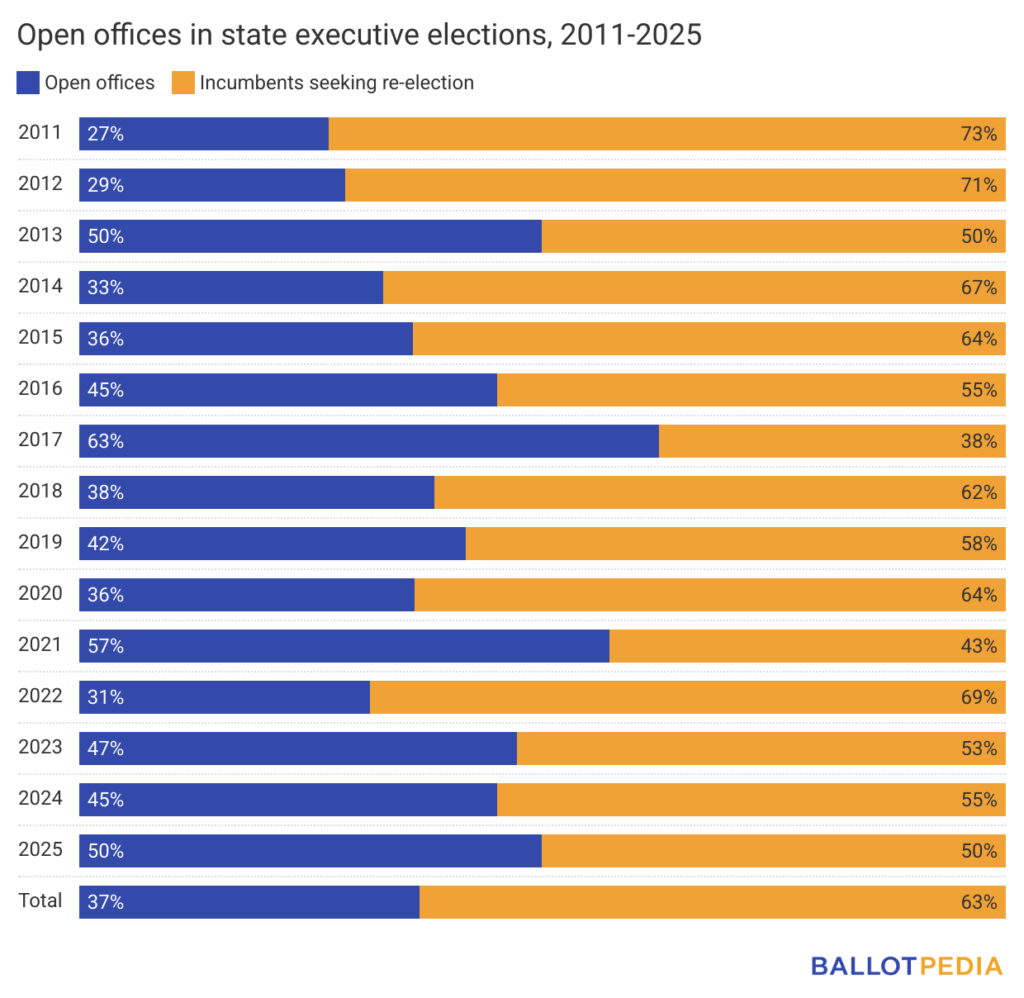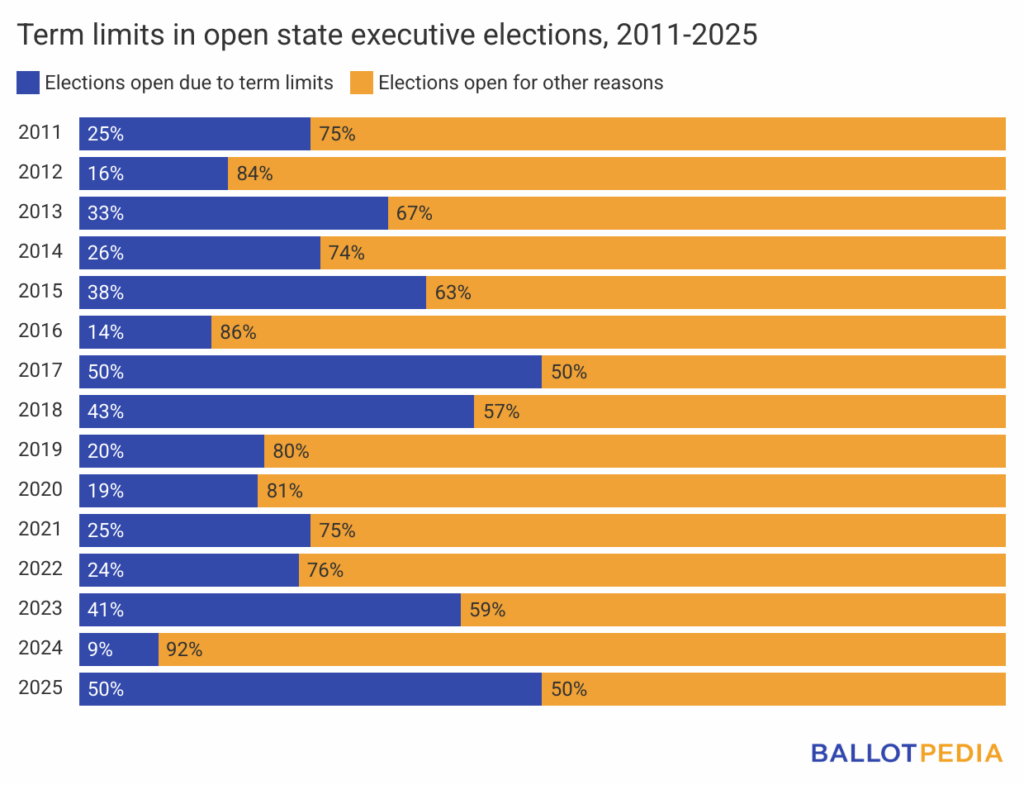Welcome to the Tuesday, Oct. 14, 2025, Brew.
By: Lara Bonatesta
Here’s what’s in store for you as you start your day:
- Ballotpedia's Top 10 elections to watch this Nov. 4
- A look at state executive election competitiveness in 2025
- Judge restricts ESG use in American Airlines 401(k) plan
Ballotpedia's Top 10 elections to watch this Nov. 4
With three weeks to go until Election Night, our staff is busy preparing to cover more than 10,000 elections and with more than 20,000 candidates across the country. Out of all those races, our team has selected 10 of the most important, compelling, and competitive elections in the country.
We selected these elections based on past results, unique circumstances, and forecasters’ ratings, ensuring a mix of congressional, state, and local races.
Below, we provide a brief summary of each race, along with a link to our more comprehensive coverage on Ballotpedia.

Virginia gubernatorial election: Abigail Spanberger (D) and Winsome Earle-Sears (R) are running to succeed incumbent Gov. Glenn Youngkin (R), who is term-limited.
According to USA Today’s Savannah Kuchar, "The Commonwealth is heralded as a national bellwether, like clockwork every four years. Held in the odd year after the presidential election since 1869, Virginia's gubernatorial race is a cyclical scorecard for voters' moods and the issues at the forefront of the national consciousness."
New Jersey gubernatorial election: Mikie Sherrill (D), Jack Ciattarelli (R), Vic Kaplan (L), and Joanne Kuniansky (Socialist Workers Party) are running to succeed incumbent Gov. Phil Murphy (D), who is term-limited.
According to The Washington Post’s Hannah Knowles, the election may also give insight into how voters feel about each political party: "Democrats are eager to make the race a referendum on the president and accuse Ciattarelli of cozying up to Trump for political gain. [...] Republicans hope to make it a referendum on liberal leadership in New Jersey."
Texas' 18th Congressional District special election: Amanda Edwards (D), Jolanda Jones (D), Christian Menefee (D), Carmen Montiel (R), and 12 other candidates are running in the special election to succeed former Rep. Sylvester Turner (D-Texas), who died on March 5.
This election could have implications for votes in the House. According to The Texas Tribune: "With Turner’s seat vacant, the House breaks down to 220 Republicans and 213 Democrats, allowing the GOP to win a majority on the floor even with three defections from their ranks. If Turner’s seat were filled, likely by a Democrat, the GOP could withstand only two defections."
Virginia House of Delegates elections: All 100 seats are up for election. Democrats have a 51-48 majority in the chamber with one vacancy. Democrats can not lose any seats and still maintain their majority, while Republicans need to win three seats to gain a majority.
Pennsylvania Supreme Court elections: Three justices on the seven-member Court—Christine Donohue (D), Kevin M. Dougherty (D), and David N. Wecht (D)— are up for retention elections. Currently, Democrats have a 5-2 majority on the Court.
The Court has been Democratic-controlled since 2015. If voters do not retain a justice, Gov. Josh Shapiro (D) can appoint a temporary replacement until 2027 with approval from two-thirds of the Republican-controlled Pennsylvania Senate. If all three justices are not retained and the Senate does not approve Shapiro's nominees, the Court would be split with two liberals and two conservatives.
Virginia Attorney General election: Incumbent Attorney General Jason Miyares (R) and Jay Jones (D) are running for an office Republicans won by 0.8 percentage points in 2021.
University of Virginia's Larry Sabato said, "Jason Miyares is the incumbent, which means Jay Jones has a tough race automatically against an incumbent. But go back four years: Miyares beat the Democratic incumbent. How? He had coattails from Youngkin." Sabato said that in the election, "The greatest threat to Jason Miyares is not really the Democratic nominee. It's Donald Trump. It's coattail."
Georgia Public Service Commission elections: Special elections are happening for two seats on the seven-member commission. Currently, all members of the commission are Republicans. Incumbent Commissioner Tim Echols (R) and Alicia Johnson (D) are running in District 2. Incumbent Commissioner Fitz Johnson (R) and Peter Hubbard (D) are running in District 3.
The Atlanta Journal-Constitution's Mark Niesse wrote that this was the first election "following three years of canceled races and a court battle over the legality of statewide voting that has elected only one Black candidate to the board."
Mayoral election in Minneapolis, Minnesota: Incumbent Mayor Jacob Frey, Omar Fateh, and 13 other candidates are running in the nonpartisan general election.
While the city's mayor has been a DFL member since 1978, this election has highlighted divisions within the larger party. Local media outlets have described the split as between democratic socialists or progressives and moderate or establishment democrats, with Fateh belonging to the former group and Frey belonging to the latter.
Mayoral election in New York, New York: Zohran Mamdani (D/Working Families Party), Curtis Sliwa (R/Protect Animals Party), Andrew Cuomo (Fight and Deliver Party), and seven other candidates are running to succeed incumbent Mayor Eric Adams (D), who suspended his campaign.
In the primary, Mamdani defeated Cuomo in the third round of ranked-choice voting (RCV) 56% to 44%. Both candidates advanced to the general election because in New York, candidates can run on multiple party lines.
Mayoral election in Seattle, Washington: Incumbent Mayor Bruce Harrell and Katie Wilson are running in the nonpartisan general election. The two candidates advanced from the nonpartisan primary election, with Wilson winning 51% of the vote and Harrell winning 41% out of eight candidates.
The Seattle Times’ Daniel Beekman wrote that “Their mayoral matchup pits a longtime politician with deep local roots against a community organizer with an urbanist bent.” The last incumbent Seattle mayor to win re-election was Greg Nickels in 2005.
Click here for an in-depth look at the races included in our list. You can also check out other races that we're following as battlegrounds, here.
A look at state executive election competitiveness in 2025
In 2025, four out of the eight state executive offices up for election have no incumbent running, meaning those positions are open. About 42% of these offices were open in odd-year elections from 2011 to 2023, while roughly 58% featured incumbents seeking another term. Elections tend to be more competitive when no incumbent is on the ballot.
Seven (53.8%) of a possible 13 primaries were contested, and six (46.2%) were uncontested. An average of 56.3% of state executive primaries were contested in odd-year elections from 2011 to 2023.

Of the four incumbents running for re-election this year, two (50%) advanced to the general election without a contested primary. No incumbents were defeated in primaries.
Of the four open state executive offices in 2025, two of them (25% of the eight total offices up for election) occurred because of term limits.

The state executive offices up for election this year include:
- New Jersey Governor and Lieutenant Governor (Elected on a joint ticket)
- Virginia Governor
- Virginia Lieutenant Governor
- Virginia Attorney General
- Georgia Public Service Commissioner (Two seats)
- Wisconsin Superintendent of Public Instruction (April 1 election)
Of the various types of executive offices, only seven exist in all 50 states: governor, attorney general, superintendent of schools, insurance commissioner, agriculture commissioner, labor commissioner, and public service commissioner. Other state executive offices include lieutenant governor, secretary of state, treasurer, controller, auditor, and more.
Click here to read our 2025 state executive competitiveness report. To read more about state executive official elections in 2025, click here.
Judge restricts ESG use in American Airlines 401(k) plan
A version of this story appeared in our Economy and Society newsletter on Oct. 8. Click here to sign up.
On Sept. 30, U.S. District Judge Reed O’Connor issued a final ruling in Spence v. American Airlines Inc., siding partly with a pilot who sued the airline over environmental, social, and corporate governance (ESG) linked retirement investments. O’Connor ruled that American Airlines breached its duty of loyalty under the Employee Retirement Income Security Act (ERISA) because it allowed non-financial goals to influence its 401(k) plan.
This case marks the first federal on-the-merits ruling restricting ESG considerations in a company retirement plan.
O’Connor ordered the airline to remove ESG considerations from its retirement plan, appoint independent benefits committee members, and bar non-financial proxy voting. However, O’Connor did not award monetary damages, saying the plaintiffs showed no financial loss.
In case you're not familiar with the term, ESG investing is an asset management approach that considers environmental, social, and corporate governance practices. It's a type of stakeholder investing that says shareholder returns should not be the only goal. Stakeholder investing contrasts with traditional approaches that exclusively consider financial factors like balance sheets, income statements, and valuations to maximize risk-adjusted returns (also known as shareholder investing). To learn more about ESG and commonly considered investing factors, click here.
The case was filed in June 2023 and challenged American Airlines’ use of BlackRock as a plan administrator, alleging the firm’s ESG-aligned proxy voting violated fiduciary obligations. O’Connor had issued a similar order in January 2025, finding that American Airlines breached its duty of loyalty when it allowed ESG considerations to influence its retirement plan.
Ballotpedia covers ESG as part of our ongoing commitment to providing comprehensive, up-to-date political information beyond election coverage. To learn more about arguments for, against, and about ESG, click here. For more information on reform proposals related to ESG policy, click here.


